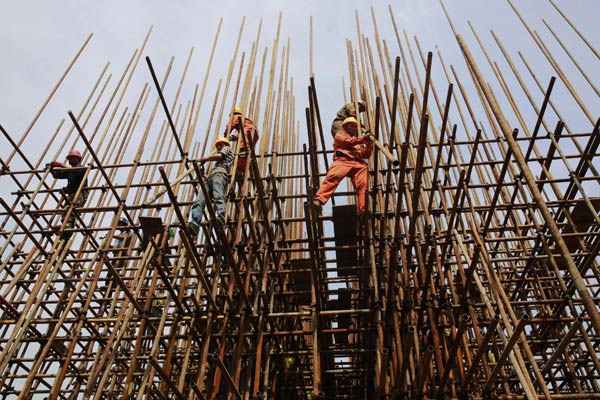

Workers set up scaffolding at a construction site in Jiujiang, Jiangxi province. China should be disciplined about GDP growth as it transforms its pattern of economic growth, experts say. ZHANG HAIYAN/CHINA DAILY
'Nation needs to be disciplined as it transforms' its growth pattern, economist says
China should be disciplined about GDP growth and not overuse available leverage, which can cause distortions, or revert to old growth patterns, especially post-crisis growth patterns, said Michael Spence, professor of economics at the Stern School of Business at New York University and a Nobel laureate in economics.
"If growth dips below 7 percent, the markets will be a little scared, but the reason is either they don't have the information or they don't process it to be able to tell whether it's a transition or a trend.
"A trend means the economy keeps going down. A transition means it's a low, and growth will return with a more sustainable pattern," Spence said during an interview on the sidelines of the Jinjialing Fortune Forum 2014 held in Qingdao, Shandong province, on June 21.
He said China's leaders anticipated an economic slowdown to 7 to 7.5 percent, and they are still on target.
"If you look at middle-income countries that slow down, it's almost always because they try to keep the old growth model. It will not work anymore," he said.
The old growth model was high investment, he said, and the demand in China that will enable growth has to shift in a much more targeted way to the domestic side.
The tradable sector of the Chinese economy is not much of a growth engine now, because the rest of the global economy - especially the big importers - is growing slowly.
The government can crank up investment anytime it wants and boost domestic demand. The problem is if the returns on that investment are low, it will not generate growth, just demand, he noted.
"China is at the point where financial sector reform and other things are going to increase discipline on the investment side," Spence said.
He pointed out that it is perfectly legitimate to have more than what the People's Bank of China calls a "mini-stimulus" program if there is a serious economic downturn, but there are better and worse ways to do it.
"I don't think that a massive loosening of credit at this stage would be a very good idea because the rate of growth in overall debt is pretty high," he said.
The Chinese mainland is going through a set of transitions that other economies have faced before, he said. Spence remembers that South Korea was a major source of shoe manufacturing as was the Taiwanese economy. That was 30 years ago. Now, they are completely different economies.
The whole tradable sector in China will look different 10 years from now, and it is already happening, he said, while emphasizing that nobody expects structural reform to happen overnight.
Take deposit rate liberalization, for example. He said that what the People's Bank of China was really doing is saying it is going to liberalize in this area. That means telling companies, the markets and government departments to anticipate higher costs of funding. The warning gives them time to reconfigure their balance sheets.
He said China is completing "very serious, deep reforms", and the reform program is encouraging because it is focused on underlying fundamentals such as deepening of the financial sector, liberalizing deposit rates and regulating the shadow banking system.
In China, experience has taught people who invest in shadow banking products that the returns are high but the risk is still low because the government will guarantee their investments. Actually, the government will not guarantee a money market fund, for example, unless there is a crisis of some kind, Spence said. That is why the government is talking about regulating the sector.
In that context, shadow banking will be part of the financial sector's overall development.
It will expand the nation's savings channels and improve the supply of credit to the small and medium-sized businesses that are an important part of the growth of the domestic service sector, he noted.
"Central bank officials have been trying to get banks and the shadow banking system to behave, so every once in a while they tighten credit just to sort of issue a warning and then loosen it up again. It is a pretty complex game that's going on, but I think they are playing it pretty well," he said.
The biggest challenges for the Chinese economy are genuine, broad structural reform, the rule of law, leveling the playing field, competition and financial sector development, he concluded.
Copyright ©1999-2018
Chinanews.com. All rights reserved.
Reproduction in whole or in part without permission is prohibited.